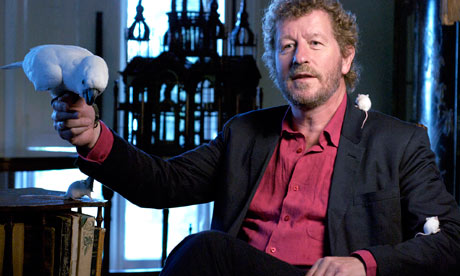
Television is currently in the throes of a heady love affair with the book. For the last few months it has explored the joy of reading and sharing; of turning the pages and entering another world. The result of this passionate pairing has been a spectacle as exciting as any Treme knees-up.
The BBC's ongoing book season has been a special joy, largely because of its focus on the intensely personal relationship we have with our favourite books. Shows such as The Culture Show and Newsnight Review consider new book releases, but BBC2's My Life in Books shows that there is no book chat as intoxicating as listening to enthusiasts discussing stories that have become an essential part of their lives.
Even host Anne Robinson can't detract from the pleasure of seeing 91-year-old PD James blush with fan-girl glee as she explains the genius of The Hound of the Baskervilles, or hearing the usually hard-boiled Giles Coren swallow a teary hiccup as he reads a killer passage from his father's favourite novel, The Great Gatsby. It's been a treat to bask in some particularly evocative readings. Sue Perkins' breathy delivery of Dostoevsky's description of Raskolnikov, the tormented protagonist of Crime in Punishment, was delectable, Rebecca Front's animated face as she brought Nicholas Nickleby to life adding an extra dimension to her reading.
BBC2's Faulks on Fiction (all episodes are available on iPlayer) may have taken a fairly traditional approach in terms of the show's structure and use of talking heads, but it also allowed us to hear fictional characters – and not just the obvious British literary icons – discussed at unusual length. Ruth Rendell got rather defensive of Zoë Heller's Barbara Covett, despite the latter's permanent air of frosty disapproval. Natasha Walter gave a warm, big sisterly account of the deluded idealism of Alan Hollinghurst's Nick Guest. The series felt like an especially enjoyable trading of ideas between well-informed, like-minded souls.
But it isn't just the BBC that's making reassuringly old-fashioned shows about the allure of books. Mariella Frostrup's Book Show on Sky Arts combines thoughtful author interviews – recent guests have included Allison Pearson, Anthony Quinn and Edna O'Brien – with tantalisingly more-ish features such as A Fine Line, in which the likes of Martin Amis and Howard Jacobson read their single favourite line in literature and then attempt to explain its power.
Over on More4 the spirit of Richard and Judy's hugely successful book club lives on in the re-vamped TV Book Club. The original winning format, based on the informal "all-comers welcome" nature of local book groups around the country, remains, but the new series is the brightest and smartest yet, much improved by the absence of Gok Wan. We eavesdrop on book lovers such as Jo Brand and Ade Edmondson as they chin wag about the latest stand-out releases, such as Emma Donoghue's Room and Michael Robotham's Bleed For Me. It's not Hay-on-Wye, but it's still good fun.
What's been particularly interesting is how convincingly most of these shows have conveyed the thrills of the book as a physical object. The Beauty of Books (available on iPlayer) has concentrated on those aspects of books which can't be replicated on ereaders. The camera lingered lovingly on rows of leather-bound gold-embossed volumes, while Richard Dormer waxed lyrical about the feel of the paper, the quality of the stitching and illustrations such as John Tenniel's surreal contributions to the original Alice in Wonderland or Penguin art director David Pelham's iconic cover design for A Clockwork Orange. In The Book Show and My Life In Books guests have responded to invitations to smell the artefacts with a swoon, as if they've been momentarily transplanted into Gatsby's own luscious rose garden.
Perhaps best, and most surprising, of all has been BBC4's When God Spoke English, (repeated tonight), Adam Nicolson's treatise on the making of the King James Bible. Nicolson pores over the curling parchment of centuries-old texts with a lascivious elation, revelling in the changing fashions in fonts almost as much as the history of the bible's 50-odd editors and their various spats. Sheer bibliophile bliss.

